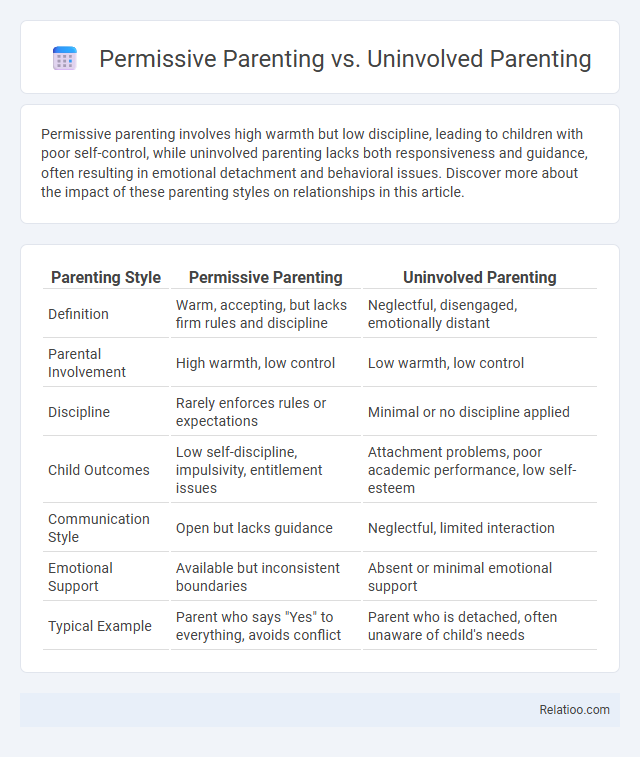Permissive parenting involves high warmth but low discipline, leading to children with poor self-control, while uninvolved parenting lacks both responsiveness and guidance, often resulting in emotional detachment and behavioral issues. Discover more about the impact of these parenting styles on relationships in this article.
Table of Comparison
| Parenting Style | Permissive Parenting | Uninvolved Parenting |
|---|---|---|
| Definition | Warm, accepting, but lacks firm rules and discipline | Neglectful, disengaged, emotionally distant |
| Parental Involvement | High warmth, low control | Low warmth, low control |
| Discipline | Rarely enforces rules or expectations | Minimal or no discipline applied |
| Child Outcomes | Low self-discipline, impulsivity, entitlement issues | Attachment problems, poor academic performance, low self-esteem |
| Communication Style | Open but lacks guidance | Neglectful, limited interaction |
| Emotional Support | Available but inconsistent boundaries | Absent or minimal emotional support |
| Typical Example | Parent who says "Yes" to everything, avoids conflict | Parent who is detached, often unaware of child's needs |
Understanding Parenting Styles: An Overview
Permissive parenting emphasizes warmth and few rules, often leading to children with low self-discipline, while uninvolved parenting features neglect and lack of responsiveness, resulting in emotional detachment and behavioral issues. Supervision plays a crucial role in balancing guidance and freedom, ensuring Your child experiences both support and appropriate boundaries. Understanding these parenting styles helps identify effective strategies for nurturing a healthy parent-child relationship.
Defining Permissive Parenting
Permissive parenting is characterized by high responsiveness and low demands, where parents provide warmth and acceptance but set few rules or boundaries, often leading to limited discipline. Unlike uninvolved parenting, which displays low responsiveness and low demands with little interaction or supervision, permissive parents remain actively engaged but adopt a lenient approach. Effective supervision contrasts with both styles by maintaining consistent monitoring and appropriate structure to foster children's development and safety.
Key Traits of Uninvolved Parenting
Uninvolved parenting is characterized by minimal responsiveness and lack of emotional support, often leading to neglect of a child's basic needs. Unlike permissive parenting, which offers warmth but lacks discipline, uninvolved parents exhibit detachment and little supervision, resulting in children facing challenges with self-regulation and social competence. Supervision plays a crucial role in child development, and its absence in uninvolved parenting can significantly hinder academic performance and emotional well-being.
Emotional Impact on Children
Permissive parenting often leads to children experiencing emotional insecurity due to lack of clear boundaries, while uninvolved parenting causes feelings of neglect and low self-worth. Supervision, characterized by attentive guidance and consistent support, fosters emotional stability and resilience in children. Research shows that balanced parental involvement positively affects children's emotional development, reducing risks of anxiety and behavioral issues.
Effects on Academic Performance
Permissive parenting often leads to lower academic performance due to a lack of clear boundaries and consistent discipline, which can result in poor study habits and self-regulation. Uninvolved parenting typically has an even more detrimental impact on Your child's education, as neglect and minimal support hinder motivation and engagement in school. Effective supervision, however, supports academic success by providing structure, monitoring progress, and encouraging goal-setting, fostering a positive learning environment.
Social Skills Development
Permissive parenting, characterized by high warmth and low discipline, often leads to children developing social skills but struggling with self-control and boundaries. Uninvolved parenting, marked by low warmth and low supervision, frequently results in poor social competence and difficulty forming healthy relationships. Effective supervision balances guidance and support, fostering better social skills, emotional regulation, and interpersonal development in children.
Discipline and Boundaries
Permissive parenting often lacks consistent discipline and clear boundaries, leading to children who may struggle with self-control and responsibility. Uninvolved parenting shows minimal supervision or guidance, resulting in children facing difficulties in understanding expectations and acceptable behavior. Effective discipline and boundaries require balanced supervision that enforces rules while promoting autonomy and emotional support.
Long-term Psychological Outcomes
Permissive parenting often results in children who struggle with self-discipline and may exhibit higher levels of impulsivity and poor emotional regulation in adulthood. Uninvolved parenting is strongly associated with increased risks of anxiety, depression, and low self-esteem due to the lack of emotional support and guidance during crucial developmental stages. Your understanding of supervision's role highlights its importance in fostering security and healthy attachment, which are critical for positive long-term psychological outcomes.
Comparing Permissive and Uninvolved Parenting
Permissive parenting is characterized by high responsiveness and low demands, where parents are warm and accepting but provide minimal discipline or structure, often leading to children with poor self-regulation. In contrast, uninvolved parenting features low responsiveness and low demands, marked by neglect and lack of supervision, which can result in emotional detachment and behavioral issues in children. Comparing these styles, permissive parenting encourages emotional support with limited boundaries, while uninvolved parenting lacks both emotional support and guidance, significantly impacting child development outcomes.
Choosing the Best Approach for Your Family
Choosing the best approach for your family depends on understanding the distinct impacts of permissive parenting, uninvolved parenting, and supervision. Permissive parenting, characterized by high warmth and low discipline, may lead to challenges in boundary-setting, while uninvolved parenting often results in emotional neglect and developmental delays. Prioritizing consistent supervision ensures your child's safety and fosters healthy emotional growth, striking a balance between guidance and independence.

Infographic: Permissive Parenting vs Uninvolved Parenting
 relatioo.com
relatioo.com